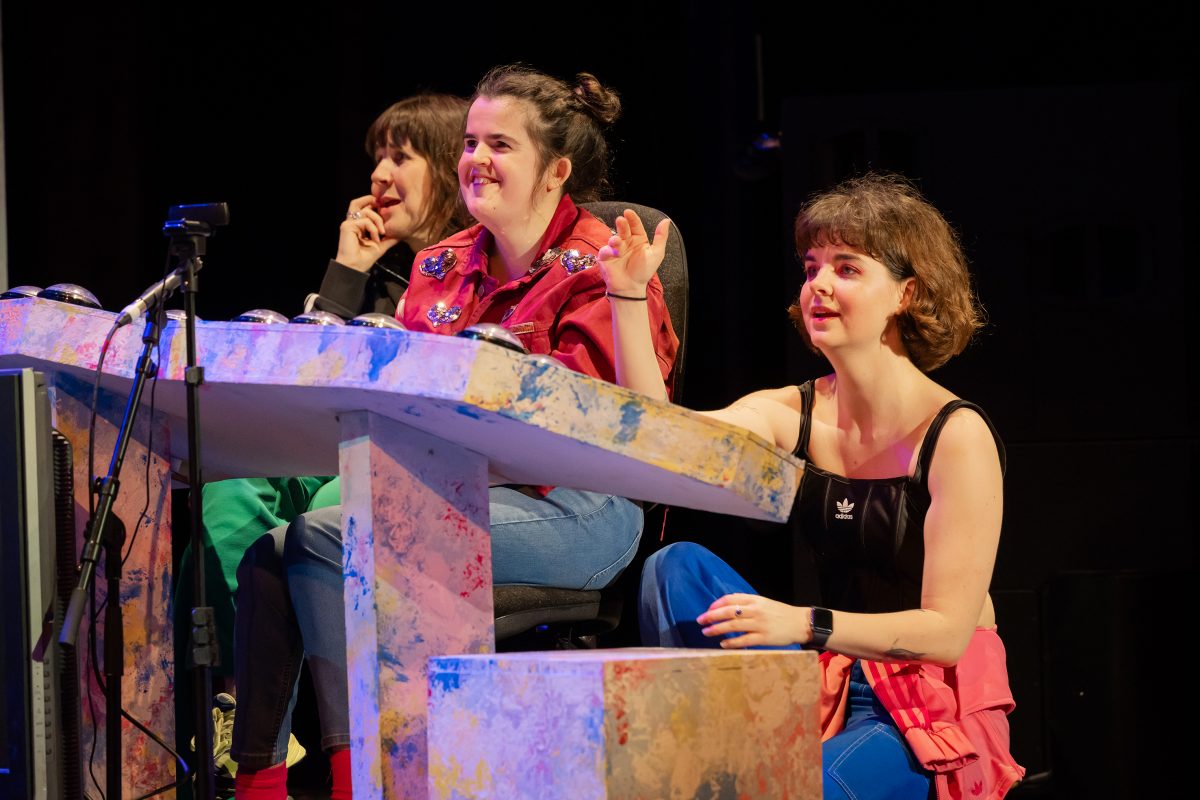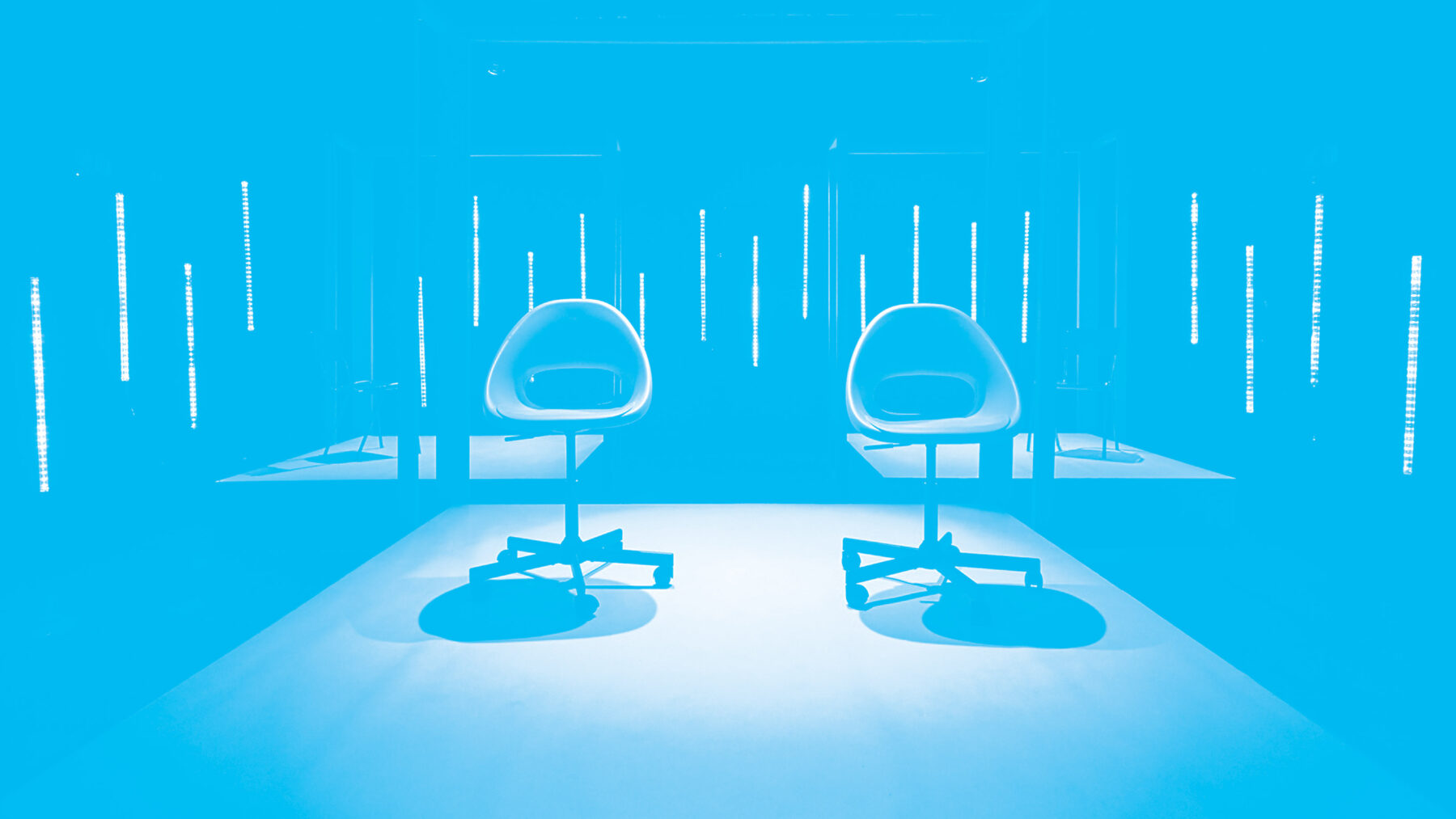Exploring access support and how can it help D/deaf, neurodivergent and disabled theatre makers.
Could you begin by telling us a little bit about yourself and your job?
My name is David Bellwood and I am the Head of Access at the National Theatre, which means I am accountable for the relationship we have D/deaf, disabled and neurodivergent people. It spans four columns which covers the physical site, the adjustments and requirements of staff members, the adjustments and requirements of audience members and where we sit in the wider industry narrative of access and disability. This applies to the work that happens in our South Bank theatres, of which there are three, in our research and workshop spaces, in our officers, in our tours and by and large what happens in our bookshop, in our learning departments and what happens on NT Live. These are all the contact points where there is an accountability element from me, but managed and delivered by others.
Are freelancers included as ‘staff’?
Freelancers are included in the phrase, it’s a broad remit and I have a relationship with various freelancers from actors, to designers, to directors.
Does your work include access needs that are beyond disability?
No, there are other access managers and access associates who work on the broadest possible range of accessibility needs, which might be something like Trans and non-binary access, access for parents of small children or small children themselves, my focus in on disability but the world of disability is very wide and it takes into account several ways of looking at disability, such as:
The medical model – which situates disability on the individual and the individual’s impairments
The social model which looks at disability as the disabling factors, physically or attitudinally built into society. The National Theatre leans towards the social model, but there are many other working models of disability, all of which we fluctuate between during the course of any conversation, but mainly focusing on the social model but with a very broad remit.
Could you briefly explain what the social model is?
In contrast to the medical model which states the disability of an individual is disabled because of his/her/their impairments, so if I do not have legs, I cannot climb a staircase, I am disabled. The social model which comes out of the disability rights movement argues that individuals are disabled by the barriers they encounter, so if I have no legs the onus is on the people who built the staircases to consider how it is a disabling factor in the lives of people who aren’t able to use staircases. It doesn’t have to be about limb loss, it’s about anyone who can’t use a staircase. It situates disability in society and therefore makes it a more shared responsibility. It has a lot of knock-on effects, especially with vocabulary, so in the UK you’re very likely to hear the term ‘disabled person’ which identified that the person is disabled by barriers, in the US they have person-first language so you will have a person with disability, so they have philosophical differences in the anglophonic world as to how we apply the model.
As a disabled person, how might I communicate my needs to my employer?
I think there are various ways and things are getting better, but they are getting better simultaneously which can get a bit confusing. The first and foremost is the Access Rider, sometimes known as a ‘work with me’ document in certain parts of the disabled communities, which fundamentally looks at the best provisions to put in place for a disabled person to thrive in the workplace. There are lots of different styles and forms of this, I would argue that the best ones actually flit between the medical model and the social model somewhat. Under the law; the Equality Act of 2010 it’s an employer’s duty to make reasonable adjustments for an employee if they are disabled and the nature of reasonability comes into three large headings:
1st – PCP: Provision, Criterion or Practice
How does an organisation function? If a disabled person needs any changes to that function, and they are in reason, then those needs to be adjusted.
2nd – the physical environment you are working in:
Whether or not that needs to be changed so the person is not disproportionately negatively affected by the environment.
3rd – Aids
Would the presence of any aids or assistance mean that the disabled person isn’t disproportionately negatively affected. It’s then our duty to put in place those aids, which might include an access worker.
So when you write up an access rider it’s important to think about what is the most reasonable presentation of my requirements to an organisation.
Sometimes riders/documents are very involved, so AXS have something called an “AXS Passport” that follows you through your career which is potentially more useful for freelancers than people who are on permanent contracts because it’s a quick way of picking up where your previous employer made alterations or adjustments that worked for you.
What are Alterations, Accommodations and Adjustments?
Alterations are different from adjustments that are different from accommodations. Accommodations is quite an American term, it’s part of the American disability act.
Adjustments sit in two spaces; adjustments or reasonable adjustments:
Any work or employer will make adjustments for any staff without them even knowing or necessarily having to fit into the umbrella of reasonable adjustments because they are not a legal process, they are just a process, if you are in a rehearsal or a creative space there are adjustments happening around you all the time, they might not count as ‘reasonable’ but they might still support your access to that space.
So the AXS passport might be a good example of what is happening but increasingly organisations and employers should be asking freelancers and employees to tell them what their access requirements are, so it should be a matter of venues sending out an option to freelancers joining saying, ‘here is a selection of ways we might be able to adjust ourselves pre-empt your requirements, do these fit and how can we make work easier for you?’
In theatre freelancer terms, that question might be asked more than once as the environment before you join might be different to what it is like to be in tech, which is different to what it is like to be in a run. So I think being aware that peoples access requirements change over the life cycle of a production is vital, I think as an industry we are getting better at, but it’s very important to keep these in mind.
What advice would you give to a freelancer who has recently experienced disability or a neurodivergent diagnosis and now understands that they need an access rider and needs to communicate this with an employer?
The resources are available online, there are lots of disability led theatre companies that give lots of pro bono advice on their websites about how to put things forward. I would strongly suggest reading up on the AXS Passport as I think it’s becoming an increasingly useful tool.
If you have an agent, it’s worth making sure your agent knows the contents of your access rider and potentially where and when that gets delivered to the organisation you are working with. Theoretically, it’s a very different onboarding cycle for freelancers versus permanent staff as you don’t go through the application and interview process in the same way as office workers might.
In society, office interviews frequently send a request for what adjustment need to be made at the point of application or interview, in the artistic freelance world, we don’t usually have a contact point and it depends on how different theatres work, is it an invitational? Is it an open access recruitment process? Is it that you are an associate of someone else who has been hired? So speaking to your agent about the best moment to put forward that access rider is very important.
A fundamental part of that is the nervousness around it, so there is a duty on the side of any employer to put in place reasonable adjustment some of which are an anticipatory requirement is saying you will probably work in a place that has a functioning accessible loo, a reasonable adjustment might be that a hoist needs to be installed in that loo to meet your specific requirements.
Some of these will have been anticipated by any employer, but it’s about not holding back your full list due to anxiety or apprehension that the organisation will shy away from you as a viable employee because the dialogue is that everyone is keen to make reasonable adjustments for the right hire. Layout of your access rider document is very important, just make it clear, what different parts of adjustment do you need; physical, access worker or BSL interpreter etc, try and make it clear as to what different requirements might come and also, if you can be quite forthcoming, if you have a fluctuating condition or if your requirements are likely to change over the course of your contract because it prepares everyone involved for really healthy conversations. In this industry we can have tight pinches on our time, like from white card, to model delivery, through to the build, that are going to be time sensitive and it’s really helpful to know that and it would be really good if that flexibility was built into the schedule but that’s not necessarily a reasonable request of producers.
Could you explain reasonability?
Reasonability sits within that dialogue, it sits between the individual and what they request and the organisation receiving the request, and how reasonable they are in processing and adapting to that request. So, are we looking at your processes? Are we looking at your built environment? Are we looking at what aids you need?
There are various ways of looking at reasonability, and there are 5 points that are generally accepted as a good litmus for it:
Is the adjustment effective? – is it going to increase your access
Is it practical? – can it be done
Is there a risk? Is there a risk involved with putting in place the adjustment
Is it disproportionately disruptive to other individuals or the organisation as a whole?
Can we afford it? – is the adjustment affordable for the organisation
If you have warning far enough in advance that should mitigate the cost, if you know you are are budgeting for hiring disabled people with fluctuating conditions some of the money should exist and there are other financial avenues such as DWP access to work scheme which freelancers can benefit from but at the same time it isn’t always easy to get the ATW award in time for a theatrical contract.
As a freelancer, who would you speak to at a company if there wasn’t an appointed access manager?
There will always be someone who is responsible for their venues’ relationship to the equality act, it might sit in an HR function or a general manager function. If the organisation has a HR function, they will be responsible for the reasonable adjustments as per their full-time staff, that’s not always straightforward so it’s better to go to the producer first and then they will be able to deal with the structures within the theatre. On some productions you often aren’t working for the theatre at all so it’s about who is your actual employer in the process because if you are working in a receiving house they don’t have the same duty of care towards you as a direct employer. Which is problematic when considering the 2nd point of the physical environment because that can sit in between responsibilities.
Is Neurodivergence a disability?
For organisations who have subscribed to the social model, such as the Arts Council has vs the letter of the law, the Equality Act uses the medical model to qualify disability, so under the umbrella of neurodiversity, if you encounter a dyslexic individual whose brains might deviate from a neurotypicality, it is not necessarily seen as a disability because it comes down to the severity of impact on your day-to-day living and that will change depending on the nature of your dyslexia. So although neurodiversity is part of my remit, it won’t always constitute a disability in conversations with everyone or every employer you encounter.
It’s important to make that clear but I think adaptations for all neurodiversity or, indeed neurological conditions can be made in the form of a standard adjustment without it needing to be ‘reasonable’.
Do you have to have an official diagnosis to ask for adjustments if you know that your form of neurodivergence would benefit from them?
Not necessarily, and also employers should be making adjustments on request without evidencing, primarily because you might not be diagnosed or statemented until too late for those adjustments to be made. Both the Department for Work and Pensions and employment law look at the fact that if adjustments are requested, an organisation, under what’s called the ‘equity duty’ (different from the Equality Act), should go towards making those adjustments. The equity duty is worth googling as it’s more in line with public organisations and the civil service, but you can use it as a good framework for understanding what we are doing in the world of access.
What is the biggest misunderstanding about access?
That Deaf and disabled people don’t notice when they’re an afterthought.
Can you give me an example of a successful inclusive theatre event?
I think there are a few! ZooCo’s Perfect Show For Rachel at the Barbican was led by a learning-disabled director, was accessible to Deaf, Hard-of-Hearing and visually impaired audiences, and included a range of disabled actors. It was a real moment of disabled joy in a theatre. Baz Theatre’s The Process reimagined Kafka’s The Trial in a bilingual world divided by suppression of linguistic minorities (Deaf BSL-users), which raised huge questions about language, access, human rights and justice.

What one thing would you like venues/theatres/arts organisations to know about how to support staff or freelancers with access needs?
I’d like theatres to programme and plan with the understanding that disabled people will be involved in projects, thinking about the additional time and difference in resource that is needed by a diverse company rather than a homogeneously non-disabled one. A lot of great work is being done in addressing how set designers, lighting designers and sound designers can work in a state of what Nicole Hughes describes as ’empathetic design’ (link?), knowing that all audiences do not experience performance through a singular normative prism. There will always be certain barriers between certain works of art and certain individuals, but where we work across a range of story-telling techniques and sensory information there is a moral duty to examine why we would allow barriers to persist in our practices: we are responsible for the barriers we make.
Thank you so much David.
Main photo credit: Henri T
Links to support, advice and access rider help:
Creating your own access rider:
- weareunlimited.org.uk/resource/creating-your-own-access-rider
- musiciansunion.org.uk/legal-money/workplace-rights-and-legislation/equality-rights/disabled-musicians-rights-and-support-at-work/access-riders-for-musicians
- shapearts.org.uk/news/access-docs-for-artists-resource
- wyldwoodarts.co.uk/our-projects/access-riders
Creating an access rider for participants
AXS Passport
Other resources
- theatrecastingtoolkit.org/resources
- boptheatre.co.uk/resources
- sicofficial.co.uk
- writersguild.org.uk/access-rider
- disabilityarts.online
- doorinthewall.co.uk/for-artists/access-support
- allin.online/support_organisation/access-all-areas
- shapearts.org.uk/Listing/Category/resources
- vocaleyes.co.uk
- graeae.org/accessibility
- exceptionalindividuals.com
- accesscard.online
Advocating bodies


